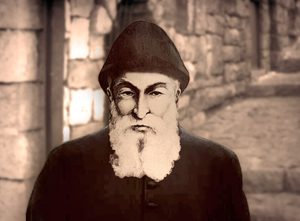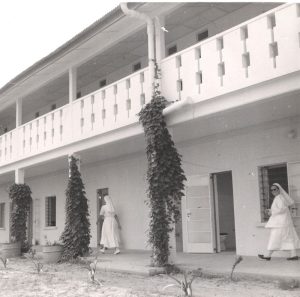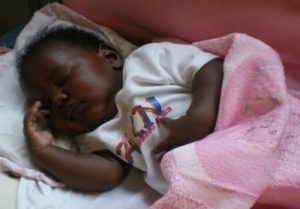by Suzanne Ryder RSM Ireland 24.01.2026
 “It won’t last,” says the seasoned voice; but I want it to linger. Through my upstairs window this morning, I am transported to a childhood memory of the momentary delusion of the world falling away, while I am rising miraculously. It’s a bit like the conundrum of sitting on a train in the station when another train moves. Two worlds in transit, beyond my comprehension. Am I the moving part, or is the strange motion belonging to the other perspective?
“It won’t last,” says the seasoned voice; but I want it to linger. Through my upstairs window this morning, I am transported to a childhood memory of the momentary delusion of the world falling away, while I am rising miraculously. It’s a bit like the conundrum of sitting on a train in the station when another train moves. Two worlds in transit, beyond my comprehension. Am I the moving part, or is the strange motion belonging to the other perspective?
That day, my brother and I were to accompany our mother on her regular visit to a hairdresser in Cong, some seven miles away. I felt a certain excitement, even though it meant waiting, while all the washing, styling, and drying of hair took place. Still, it involved some variety in an empty space during Christmas holidays from school. I was ready for off! But I was in no way ready for the sudden thrill, the moment of disbelief, as snow began to transfigure the familiarity of my normally grey, ball alley, Abbey Street view.
We were sent off together, to begin leading the pilgrimage on foot. We would be picked up by car. You see, it wasn’t going to last. Two small adventurers, warmly clad and wellingtoned, we headed up the town, crossed the road at the bank corner, heading along Main Street. White flakes came from every side, as if secretly wishing to whisper urgent, surreptitious secrets. Along Bowgate Street, our noses met a new, clean cold. The familiarity of our well-known Ballinrobe was putting on a new face, a muffled mask that seemed to boast, “See what I can do!” Some adults showed a brisk uncertainty of gait, as though teetering uneasily between known normality being suddenly upended, and a secret access that might reveal new promises that could open through this unannounced pleasurable presence.
We turned on to the Neale Road, our steps turning into a more hesitant, trudging pace now. Our eyes were adjusting to that out of the usual, shimmering of light. Tiny puffballs toyed with our vision, urging our small fists to rise, clearing snowflakes from our eyes, giving new sight to our rapidly changing view. Then, just beyond the houses (were we really on the right road?) tyres squelched to a stop beside us, and we recognised a voice calling us to safe shelter. New plan…turn around…let’s head home.
Saint Thérèse of Lisieux received an insight when she saw an early elevator bringing hotel guests effortlessly to other floors. It might have made a strange mechanical rattle as it moved people mysteriously up and down. However, in her nineteenth century contemplative mind, it reflected what God can do for a human soul in ways unseen, with a sudden uplift, through no action of its own; a larger presence with unknown power.
While I reminisced on other days, this morning, I was called into that spacious silence, where the outer world is held suspended for a time, and things as usual are adrift. There was an inducement to let go of the scheduled, timetabled routine, while reality could find itself anew in reflection. A magician’s sleuth like trick of drawing attention away from what I thought I had desired, only to reveal a mystery prize in the least expected place. A short sojourn, enabling review.
Snow hasn’t lasted on my winter scene. The window is back this afternoon to courtyard grey. However, my day has been touched by a tinge of mystic enchantment; not by seeing a rabbit in a hat or by finding a coin behind my ear, but by uncovering wordless, wondrous memory. I hope this gift will last.
First published on 20/03/2025 by Mercy Ireland
 Recently I wandered down to Our Lady of Lourdes Church as part of my daily outing – indeed one of my very first post-surgery walks. It was early afternoon and I was surprised to see the car park full to overflowing with car registrations for all over this part of Ireland. What was happening? This was the Syro-Malabar bi-monthly Mass and the Indian Christians were here in throngs. The church was filled with young parents, children from birth onwards and a great crowd of youth. I was certainly the oldest member of this enthusiastic congregation!
Recently I wandered down to Our Lady of Lourdes Church as part of my daily outing – indeed one of my very first post-surgery walks. It was early afternoon and I was surprised to see the car park full to overflowing with car registrations for all over this part of Ireland. What was happening? This was the Syro-Malabar bi-monthly Mass and the Indian Christians were here in throngs. The church was filled with young parents, children from birth onwards and a great crowd of youth. I was certainly the oldest member of this enthusiastic congregation!by Sr. Sheila Campbell, MMM Ireland 17.01.2026
 Recently my brother sent me a short announcement about a forthcoming lecture in the local University about Humility. Oddly enough the lecture was to be given in the Medical School, which I found rather ironic as some of the consultants I have known in the past would not have been renowned for that virtue.
Recently my brother sent me a short announcement about a forthcoming lecture in the local University about Humility. Oddly enough the lecture was to be given in the Medical School, which I found rather ironic as some of the consultants I have known in the past would not have been renowned for that virtue.
Is it a virtue? That is what I was left thinking about. The word is not used much nowadays because it often implies a creeping obsequiousness, or a low self esteem. In the blurb about the forthcoming lecture, it used words like ‘humblebragging’ and ‘arrogant humility’. I suppose that is when people say, “in all humility, I do ….” And then they go on to boast about their achievements or academic success.
However, I think the word humility, for me, is linked to the Latin word for earth, or ground, “Humus”. The key to humility is exactly this ability to be rooted, firmly planted. When one is in touch with the reality of life, including our gifts and talents, a false humility would be to deny them or play them down. A true humility takes them for what they are, gifts, gifts to be used for the benefit of the common good.
Am I a humble person? No, I don’t think so. I still have too much to shed before I can return to my basic sense of the person I am before God.
But I have decided that yes, it is a virtue that I would like to attain one day. So, thank you, John, for giving me food for thought today!
by Sr. Liana de Jesus MMM Brazil/USA 14.01.2026
 Consecrated Religious Life lives in a time of great transformations with profound changes. , This leads us to think that challenges multiply, especially among the new generations directly involved in them, as well as the other generations challenged by the new reality. Changes in new technologies. such as the internet, mobile phones, and social networks. These facilitate information, break down geographical and cultural barriers, and create cultural multiplicity. Because of these changes, consecrated life is challenged to seek a new identity and a resignification to better respond to the “signs of the times”.
Consecrated Religious Life lives in a time of great transformations with profound changes. , This leads us to think that challenges multiply, especially among the new generations directly involved in them, as well as the other generations challenged by the new reality. Changes in new technologies. such as the internet, mobile phones, and social networks. These facilitate information, break down geographical and cultural barriers, and create cultural multiplicity. Because of these changes, consecrated life is challenged to seek a new identity and a resignification to better respond to the “signs of the times”.
The time we live in is marked by intense, fast and profound changes. This leads us to think that after the “time of change” many of the old-style models support a worldview, insecurities and even disorientation. For the late Pope Francis “this change of season was produced by the huge qualitative, fast and accrued jumps that occur in scientific progress, technological inventions in various areas of life”. Changes are in all grounds and in all human actions, which straight or circuitously affect religious life. Even, “the reoccurrence to the holy and the mystical exploration, which symbolizes our time, are equivocal miracles”.
Today everything seems temporary. Human relations are temporary, marriages are temporary, work is temporary, are also provisional, and we live in an environment full of indecision about the future. However, Religious Life continues to bear the permanence of obligations, even though it suffers the bitter losses of people who abandon it. This makes us think that “if the dedication to permanent values is in crisis, it is since the actual idea of the period is also in crisis.” Constant and strong values have little chance of happening in a fragmented life practiced in disengaged incidents and events.
This is our challenge in 2026!
by Sr. Christine Gill, MMM Ireland 10.01.2026
 Soon after my First Profession of Vows, I was on my way to Nigeria. I was in my late twenties and had no experience of Africa at all, so everything was new and exciting. Leaving Ireland I thought I was going to a hospital in Obudu, but I was met at the airport by my new Regional Superior and was told, no, not Obudu, but Nkalagu.
Soon after my First Profession of Vows, I was on my way to Nigeria. I was in my late twenties and had no experience of Africa at all, so everything was new and exciting. Leaving Ireland I thought I was going to a hospital in Obudu, but I was met at the airport by my new Regional Superior and was told, no, not Obudu, but Nkalagu.
I had never heard of the place – was it an MMM mission? No, I was told, it was a cement factory which had its own hospital and MMM had
been asked to administer it in 1962. It was totally Nigerian, set up and administered by Nigerians, but the top engineers and technicians were international, mostly from European countries. They had their own hospital, which was bright, modern and equipped to a high standard. All the treatments were free for the employees of the cement factory, and the local people could be treated at a reduced rate.
I liked it in Nkalagu, and we were kept busy. We were four, Srs. Madeleine Canno, Oliver Murphy, Áine Lucey and myself. I remember one occasion when a local chief brought two of his wives to the hospital. The second wife was in labour and had a prolapse of the uterus during childbirth. Fortunately, we had a wonderful Spanish doctor who cared for her, and she recovered. The chief was so grateful he brought us a big fat ewe as a present!
However, we began to hear rumour of war. No, no, it will never happen, some said. But there were skirmishes, and injured soldiers began coming for treatment. One of the local army Coronels was friendly to us and began warning us to be ready to leave. So, we had our suitcases packed but continued on with our daily work in the hospital. Then, one day the Coronel came. “You must leave now! The troops are only three miles away and are coming in this direction.” But we were also warned not to leave before nightfall. At night we would not be visible for sniper fire. Just before leaving, our watchman called us to look at the fat ewe we had been given – three little lambs had appeared! But in spite of the rejoicing, we knew we had to leave.
It was a three-hour journey to the nearest MMM house, Abakaliki, but it took us several days as we had to take refuge in an abandoned priest’s house. But the story of the journey from Nkalagu is another story.
And the cement factory? It was taken into federal control and eventually closed in 2000. This year there are whispers to re-open it again, but MMM will not be returning.
by Sr. Sheila Devane,MMM Ireland 07.01.2026
 I have heard many sermons- maybe too many? I only remember a few. Those I do recall were built around stories. The story carries the message. Let me tell you of one sermon I remember and which I use from time to time in my own life when things have gone off kilter and become unbalanced – again!
I have heard many sermons- maybe too many? I only remember a few. Those I do recall were built around stories. The story carries the message. Let me tell you of one sermon I remember and which I use from time to time in my own life when things have gone off kilter and become unbalanced – again!
The priest was Ugandan preaching in Swahili in Tanzania to a local audience. The people there often asked: “Who is saying the evening mass in Ulenga Parish?” When it was Fr. Rudi the community of Christians, of whatever denomination, tried to attend as his sermons were so practical. He was a storyteller, and it was clear that, like Jesus, he was telling a story not narrating an historical fact in every single detail. The gospel that evening talked of hypocrisy and pretense so we knew Fr. Rudi would not disappoint. He did not!
A couple living around Lake Victoria in Uganda went on a date one sweltering day; it was a great area for fishing, so they duly called into a local shack to buy themselves fish and tasty chips made from plantain for the picnic they planned. They walked around the lake admiring the scenery and eventually found some beautiful rocks to sit down on and enjoy their food. Pauline gracefully carried the load on her head wrapped in her colourful cloth which hopefully kept the food fresh in the tropical heat. They were so hungry and thankfully too they had brought along sodas to quench their thirst!
To their utter shock when they opened the inner parcel carefully wrapped in newspaper, they found money – all the poor fishmonger’s takings in notes and many coins. No wonder the load felt so heavy for Pauline. What to do? They were really starving and although they were surrounded by fish swimming in the lake, not one was ready to be eaten! Charles thought for a few minutes and then they decided they would head back to the fishmonger before dusk with his money – far, far more than they had paid and return it all to him. Certainly, a noble, just, and honorable thought. Back they both trekked and this time the journey was far less pleasant as they were tired, hungry, hot, and fed up with themselves and the load felt even heavier.
The fishmonger having missed his day’s earnings, was totally bereft and in a state of despair when the pair arrived to return his money – and get some fish and chips for themselves! He was stunned beyond belief at their justice and kindness and called out aloud in prayer and praise of this couple. He jumped up and down, danced enthusiastically, threw himself on the floor and all in all had the best few moments of his life to the surprise and glee of everyone in sight! He immediately asked to take a picture of the couple as he needed to advertise this act of honesty to customers at his shack, in his local church and anywhere he could. He spoke of this being the true example of honesty he and his fellow workers needed in their little businesses as they were so often ripped off.
Pauline and Charles refused any photograph. He insisted; they refused, and back and forth they went like this for a while. The fishmonger could not understand why on earth they would not want the praise they deserved for their good deed nor why they were refusing him to spread this first-class example of proper Christian behavior. They were adamant and it ended there.
Pauline was married to another man, and Charles to another women. They were hiding and cheating. Publicity was the last thing they needed. Fr. Rudi invited us to look at the areas of contradiction and thus cheating in our own lives. I am trying. I remember. Amen.
by Sr. Margaret Anne Meyer, MMM USA 03.01.2026
 Since Kilimanjaro Airport was near to the foothills of Mount Kilimanjaro it was decided that I would do a private retreat with the Contemplative Sisters who had a convent in that area, before returning to Dareda. It was an exceptionally enjoyable time in my life, having had the joy of my mother’s visit for three weeks and now being able to pray in such beautiful surroundings. I was very thankful to God for all His blessings.
Since Kilimanjaro Airport was near to the foothills of Mount Kilimanjaro it was decided that I would do a private retreat with the Contemplative Sisters who had a convent in that area, before returning to Dareda. It was an exceptionally enjoyable time in my life, having had the joy of my mother’s visit for three weeks and now being able to pray in such beautiful surroundings. I was very thankful to God for all His blessings.
Upon returning to Dareda, I saw many children who were admitted with burns. Because of cold nights, a kerosene lamp would be near their bed and somehow it would fall into bed. Many children required repeated skin grafts. This was an ordeal for the child and for the doctor. The Flying Doctors taught us how to make the most of a small graft by trying to thin it out like a fish net. This worked. Sometimes the burned area was very extensive, and I asked one mother if I could take some of her skin for her child. It worked the first time but not the second. One child developed tetanus three weeks after he was burned. He survived it all. It was touch and go for a long time. Some children did very well for three weeks and then died suddenly. I asked Mr. Michael Woods, who was the chief surgeon and founder of AMFREF, the Flying Doctor Service, why did this happen? He replied, the burn had caused a lack of plasma proteins, and this resulted in liver failure from lack of protein. We tried to give protein supplements from then on. It really did help.
Martin Woods, the brother of the surgeon, Michael Woods, and his wife had come to set up a workshop to train some local young men in carpentry, mechanics, and some electrical work. Martin was very skilled and produced a solar system barrel that could give one a very warm shower using a hose. I agreed to experiment with the process. Martin wore his bathing suit, and I held the hose. It is the closest I ever got to being John the Baptist. It worked! All were delighted.
.
Soon Christmas came and the Church was beautifully decorated. Bishop Winters had brought Conamara marble for the pillars and the old cathedral was very impressive structure located at the foothills of the rift valley escarpment. Great pains had been taken to twist coloured papers in chains of circles up and down the pillars and across the aisles. These were interspersed with sprays of bougainvillea flowers of various hues. The nurses dressed to present a Nativity scene, complete with a Christ-like baby figure to be placed in the decorated crib. The choir chanted a K’IRAQ song, Mother. It was so touching. People came from all over for Midnight Mass. We had to get our seat at 11pm and afterwards from 2-3am enjoyed some refreshments with an English couple. Olivio and his mother came the next day. It was a joy to see them again.
A big sprig of evergreen was our lovely tinsel decorated tree. We opened some presents and went to bed at 3 AM rejoicing in the love and peace of the Lord and of each other.
by Sr. Sheila Campbell MMM Ireland 31.12.2025
 Recently I was on retreat in a lovely country estate which had its own woods and even a lake with two swans swimming peacefully up and down. I had a great rest, and I will leave it up to God to tell you about how much praying was done! Certainly, I felt I slept a lot!
Recently I was on retreat in a lovely country estate which had its own woods and even a lake with two swans swimming peacefully up and down. I had a great rest, and I will leave it up to God to tell you about how much praying was done! Certainly, I felt I slept a lot!
But I had a lovely experience one day I was out walking. I like to walk in the early morning, before sunrise. It was cloudy so there was no moon to shed its light on the road. I was walking along, staring ahead into the gloom. I could see that there was a bend coming up soon in the road, but because of the poor light, I could not make out if the road would bend to the right or the left. I wondered about that, unsure of whether to proceed or not. But I plodded on and when I reached the bend it curved gently to the left – you could hardly call it a bend at all!
I thought about that road – yes, it is just like life. We are called to journey along and our life will take unexpected and unforeseen turns. But in the end of the day, all we are called to do is to plod on and the God will guide us round the ‘bend’ when we come across them.
One day we will reach the end of life’s journey, but as God has been my faithful guide and companion on the journey, I am sure he will be just ahead of me on the path as I touch the gates of heaven.
by Sr. Anna Finnegan, MMM Ireland 27.12.2025
 After reading Jo W. Doyle’s Blog on 6/12/25. I was reminded of one Christmas Nativity Play in Irele, Nigeria, in 1991.
After reading Jo W. Doyle’s Blog on 6/12/25. I was reminded of one Christmas Nativity Play in Irele, Nigeria, in 1991.
In preparation for the Nativity Play we gathered the little children from around the parish and the hospital compound to practice the carols and to act out the story of the birth of Jesus.
I found a big doll, which I painted black and every time we came to gather to practice all of the children wanted to hold it, so as a result the colour on the doll wore off!
When the day came to celebrate Christmas, that morning the gardener made a lovely shelter from sticks. The children got together to decorate it with yellow and purple bougainville. Inside the shelter, the crib for Jesus was a big basket, lined with straw.
We had separate patches on the compound for Mary, kneeling on a mat, and Joseph resting with his lantern and staff, near by. Then the three Kings who were further up at the top end of the Compound waiting with Stella, who was a little daughter of one our kitchen staff. She held a large star on a long stick and was to lead the Kings down to the Crib. Then the Shepherds were beyond the shelter. there were about twenty of them, as we wanted all the children to be included. At one stage, while waiting for their parents and Staff to arrive, some of the children were getting impatient. One little boy came over and said, “The Shepherds are fighting !!” So, we re arranged them so that some Shepherds could go to the back and rest, and the other ten would keep clattering their sticks. as they said they needed to keep rats away from Jesus s Crib…
We had a throng of Angels with little crowns on their heads, and they were to begin singing in their Yoruba language after the Angel Gabriel would come to Joseph with the message to take Mary as his wife.
Just before beginning I had asked Shola, one of our caring staff, if she would slip her newly-born baby into the crib. She had delivered her child in our Maternity, just six weeks before then. She was very happy and she did it so discreetly, without anyone knowing about it
One of the nursing staff began with the reading of the birth of Jesus as the Angel Gabriel came to Joseph, but he did not respond as he was in a deep sleep with the heat of the day. There was a long pause…. Then someone summoned Gabriel to go back and give him a good shaking. It was funny as poor Joseph jumped up and ran over to Mary forgetting his stick and lantern and hardly knew what to do, but it was not long until he got help.
Then the throng of Angels arrived at the Crib, still singing and dancing. Suddenly the baby made a little whimper and there was pandemonium! The Angels started shouting and jumping around. They could not believe what they were seeing. Then all the children came running out from all over the Compound to see what was happening. Had Jesus come to life?? There was a great confusion and wonder. Everyone was happy and surprised.
We all rejoiced and celebrated together. That Jesus was alive ….and is with us.
by Jo Wardhaugh Doyle Ireland 24.12.2025
 The starry night of the Incarnation, the unseen miracle, the 25th of December, the birth of Jesus, and the day Santa arrives, is full of noise, light, song, cheer, food, celebration of family and friends; But back in the day it happened with no fanfare or noise. Incarnation, like Resurrection happened in darkness.
The starry night of the Incarnation, the unseen miracle, the 25th of December, the birth of Jesus, and the day Santa arrives, is full of noise, light, song, cheer, food, celebration of family and friends; But back in the day it happened with no fanfare or noise. Incarnation, like Resurrection happened in darkness.
So, I have to ask the question. Why is the darkness so important before light can be revealed.
I do love the story of the birth of Christ in Luke’s gospel. It was all so ordinary. People moving to their home constituency for the census, no room for outsiders, Joseph and Mary just unknown unseen people, not exceptional or remembered; but Mary knew something had happened nine months previous when she had said Yes, her Fiat. She had been touched. There was no certitude or intellectual discussion. She had just said yes, with no verification of what that meant. She held these words that had been spoken to her in her heart for the rest of her life, letting them unfold into a living light of love and loss, joy, and grief. She let these words unfold into love of her son. Born in darkness, with joy, born like an amazing miracle. She looked and gazed upon him like any mother wrapped in silence. This child, this cherished child was hers. Her life changed forever with a deep awning of love. She pondered all these things in her heart and wondered did every mother feel this way?
It was a cold night, but the stars were twinkling so brightly it did look like the gods were talking to each other across the heavens; But all Mary and Joseph saw were shepherds coming closer to them, they had shepherded their sheep with them, five Shepherds in all, old and young, who wondered had their water being changed to wine. They wondered had they heard right. They wondered where they drunk. So, they wandered into town, with no certitude either. What on earth would they find with their sheep on that starry night, where they mad; When they fell upon the scene, the older man with the younger woman suckling her child, their donkey and a stray cow curious, like the shepherds as to what was going on. They were told to see their Saviour, a newborn helpless child, with poverty-stricken parents who had no place to stay. A Saviour?
But the stars had twinkled, and that voice had been so convincing with its unconvincing message. A Saviour!
Joseph welcomed them in, bewildered one and all. All of them had been touched with a knowing. It was like a secret knowing, given in darkness to them. The world had been stirring badly; these were dark times. But on this starry night, these eight people knew something unexplainable.
Do you remember the first time you saw a new life being born into this world?
I do. I was a student midwife at Our Lady of Lourdes Hospital Drogheda.
It had been a long, hard labour for the mother, and the pain of the last few pushes, well, everyone’s blood pressure rose! But that moment when the head crowned, the shoulders turned, and this amazing life fell out of the womb.
There it is. There is the light. The new life.
The cry. The declaration I am here! I have arrived.
On my first delivery, I had unpreventable tears roll from my eyes. The mother looked, wondering was everything OK. And I laughed and said everything was perfect. It is hard not to cry at watching this in front of your eyes. From the darkness of the womb to the light of new life.
Is this incarnation? The unremarkable miracle of life; And like the shepherds who went to tell the good news to all around them, we all call on our mobiles to everyone that we know and cry, do not worry anymore, the child is born, everyone is safe, everyone is healthy. All is well. The light is born and hope continues.
And the woman wraps herself in silence, pondering all of these things in her heart.
